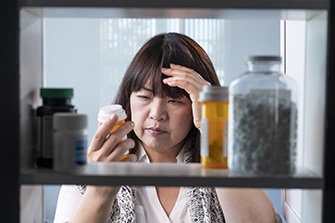Opioids and Mental Health
Opioids are a group of very strong pain relievers used to relieve pain after a surgery or traumatic injury. They are much more effective than over-the-counter pain relievers, however, they are also highly addictive. People who suffer from mental health conditions are much more likely to become addicted to opioids, making it important to understand the link between opioids and mental health.
The Connection Between Addiction to Opioids and Mental Health
- People with mood and anxiety disorders are twice as likely to use opioids as people without mental health disorders
- They are also more than three times as likely to misuse their opioid prescriptions
- Adults with mental health disorders are twice as likely than those without a mental health disorder to take opioids for long periods
- A 2016 study found that about 10 percent of people who were prescribed opioids developed depression after a month of taking the drugs, and it worsened over time
Why are People with Mental Health Disorders More Likely to Become Addicted?
There are a number of reasons why individuals with mental health disorders are more likely to become addicted to opioids. One of the major reasons is because they are trying to self-medicate, whether the mental health disorder has been diagnosed or undiagnosed. Opioids bring about a feeling of euphoria, which releases dopamine and makes a person temporarily feel good.
However, the major side effects of opioids are anxiety and depression. For someone who already suffers from anxiety and depression, getting another layer of anxiety and depression from the opioids will worsen their condition. They try to make themselves feel better by taking more and more opioids, only to continue worsening their condition. This cycle can eventually lead to death, either by suicide or overdose.
Treatment for Opioids and Mental Health
Mental health disorders can exacerbate addiction and vice versa. That is why it is so important to treat both conditions at the same time.
Dual Diagnosis
If an individual is suffering from a mental health disorder and addiction, but only treats the addiction, the long-term success of their recovery will be short-lived. Treating addiction is so much more than just becoming sober. The underlying mental health condition will eventually come back to the surface, igniting the addiction, and the individual will find themselves right back in the same spiral.
Many treatment centers, including Cliffside Malibu, offer Dual Diagnosis treatment. Those suffering from dual diagnosis experience not only the pain of chemical dependency and addiction but also a co-occurring emotional or psychiatric illness such as Depression, Bipolar Disorder, Generalized Anxiety Disorder, Social Phobia, Post Traumatic Stress Disorder, Personality Disorders, and Eating Disorders, only to name a few.
Both illnesses may affect an individual physically, psychologically, socially, and spiritually, and each illness has symptoms that interfere with a person’s ability to function effectively and relate to themselves and others. Furthermore, with dual diagnosis, not only is the individual affected by two separate illnesses, but also each illness interacts with the other, potentially exacerbating symptoms on each side and predisposing the individual to relapse in each of the illnesses.
How to Avoid Opioid Addiction
Mental illness and opioid addiction are two disorders that are suffered by millions, often co-occurring. That is why it is so important to understand how to avoid opioid addiction and what signs to look out for.
- Put self-care first. The most important thing you can do for your life is taking care of your mental health. By finding things that make you happy and doing them every day, you will be able to stay more in-tune with your body and moods. If you are suffering from a mental health disorder, make sure you keep this self-care at the forefront. Keep up with any medications and treatments you may be receiving and do what you can to keep stress levels low.
- Watch for the signs of addiction. If you find yourself taking more opioids than prescribed, are experiencing cravings, or can’t control your use — it is time to get help.
- Ask for help. Sometimes, realizing that you have an issue with opioids and mental health can become too overwhelming to deal with alone. Don’t be afraid to ask for help from a trusted support person or by contacting our admissions staff. They are available 24 hours a day to help you and answer any questions you may have, anonymously.
About Cliffside Malibu
Addiction to opioids and mental health disorders do nothing but worsen each other. It is extremely important that both of these disorders are treated together, at the same time, by a treatment program individually tailored to your specific needs.
Since no two addictions are the same, Cliffside Malibu offers an individualized treatment plan for every client. We are committed to providing evidence-based treatment through a continuum of care model including medically supervised detox, residential treatment, day treatment, and outpatient services. Our program also includes family therapy and holistic therapy, as well. Whether an individual is suffering from substance abuse and/or alcohol addiction, our programs are structured to create a supportive environment where healing can begin.
In addition to world-class treatment, Cliffside Malibu offers luxury accommodations, a serene environment, five-star dining, and plentiful amenities. We understand that addiction treatment is a rigorous process. Therefore, we provide for your comfort and relaxation at every turn, allowing you to rejuvenate, and meet the demands of treatment with your greatest energy and attention.
For more information on Cliffside Malibu, visit cliffsidemalibu.com
